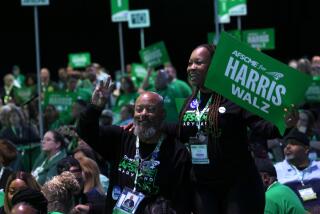Poll Analysis: Bush Is Not The Stealth Candidate He Was Right After 9/11
- Share via
After the tragedy of Sept. 11, 2001, President Bush had stratospheric job performance ratings, no Democrat would openly criticize the president or his administration for fear of jeopardizing their own career, and his goodwill among the people in the nation was formidable. Even in a Times poll taken less than two months ago, 63% of Americans thought the president was handling his job well and 52% said they would vote to reelect Mr. Bush as president in 2004. According to the current Los Angeles Times poll, the president’s overall job approval rating has declined by seven points and he is held to below 50% in a hypothetical match-up with a Democratic candidate. The standings are 45% for President Bush and 40% for a Democratic candidate.
President Bush’s overall ratings have come back down to earth and the Democrats are starting to take off their white gloves and criticize the president on his economic package and other issues on his agenda. The poll shows that Americans prefer the Democrat’s tax plan over the president’s and they also oppose Mr. Bush’s proposed Medicare redesign. The poll also shows that the close partisan differences in the 2000 election are starting to reemerge as it was before September 11th.
Democratic candidates
Among Democratic registered voters, Connecticut Senator Joe Lieberman and Massachusetts Senator John Kerry are in front of the pack with 25% and 20%, respectively. Former Senator Gary Hart and North Carolina Senator John Edwards followed each with 8% of the vote, Missouri Congressman Dick Gephardt and Florida Senator Bob Graham each with 6% of the vote, Rev. Al Sharpton had the support of 2% of the voters and bringing up the rear is former Governor of Vermont Howard Dean at 1%. These results are showing name identification of the candidates and should be seen as a baseline for the 2004 presidential election.
However, if Senator Lieberman should be the next Democratic presidential candidate, almost two-thirds of the electorate said they had confidence that if the next president was Jewish, he would be able to deal fairly with both the Palestinians and the Israelis.
Bush vs. Democratic candidate
This poll shows that the country is politically divided—91% of Republican voters would cast their ballot for Bush, while 84% of Democrats would support their party’s candidate. Independents who are usually swing voters in presidential elections would split their vote—41% for the Democrats and 38% for the president. (Independents, by 12 points in a Times’ December ’02 poll, said they would vote for Bush. The wording of the question varied slightly.) However, conservative independents by 43 points say they would vote for President Bush, while the liberal to moderate independents by 32 points would opt for the Democratic candidate. If independents remain divided, the 2004 election will be a very close race, perhaps mirroring the 2000 election.
The poll is showing a gender gap with men supporting Mr. Bush by 49% to 37%, while women are divided, 42% for the president and 43% for the Democrat. White voters are solidly behind the president—52% to 32%—while the opposite is true of minorities overall. Three in five minority voters support the Democrat to 29% for President Bush. (There were not enough blacks, Latinos and Asians to break out separately.)
How the Poll Was Conducted
The Times Poll contacted 1,197 registered voters, including 399 registered Democrats, nationwide by telephone Jan. 30–Feb. 2. Telephone numbers were chosen from a list of all exchanges in the nation. Random-digit dialing techniques were used so that listed and unlisted numbers could be contacted. The entire sample was weighted slightly to conform with census figures for sex, race, age, education and region. The margin of sampling error for all registered voters is plus or minus 3 percentage points; for registered Democrats it is 5 points. For certain subgroups the error margin may be somewhat higher. Poll results can also be affected by other factors such as question wording and the order in which questions are presented.
More to Read
Get the L.A. Times Politics newsletter
Deeply reported insights into legislation, politics and policy from Sacramento, Washington and beyond. In your inbox twice per week.
You may occasionally receive promotional content from the Los Angeles Times.










